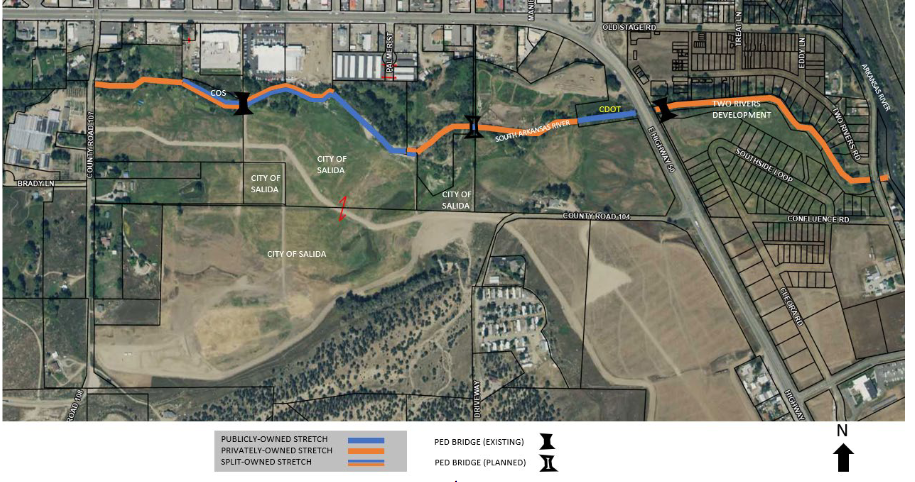The Salida City Council (SCC) passed a number of resolutions during its regular meeting on February 20, held a public hearing on the Salida Ridge Apartments project, and continued discussion of the F Street closure.

After approval of the consent agenda, Mayor Dan Shore introduced citizen comment by laying down a few new guidelines, possibly prompted by lengthy citizen comment periods during recent meetings.
“You need to be here and you need to sign up in advance,” Shore said: “The other thing is that we will take people [commenting] in person first and then online – so sign up now. I know we have been doing reflective listening for a couple years now and we are going to take a break.”
Salty Riggs made a brief announcement on behalf of BETCH. “We are working on a ballot issue,” she reported: “We have been following what Denver is doing with landlord licensing – they have to pay a small fee to get licensed the first year, and then they have to prove that their housing has passed inspection to renew.
“We think this [measure] would generate some fees for the city – not very much, we want it to be a nominal fee. We think it would have a huge impact on tenants who are living in buildings that wouldn’t pass inspection – a $100 [landlord license] charge would generate about $500,000 for the county.
“We will have details ironed out by May – just wanted to give you a heads up.”
Restoration of Arkansas River section
The first item of new business was consideration of Resolution 2024-17, supporting the Upper Ark Watershed Partnership in an application to the National Park Service’s “Rivers, Trails, and Conservation Assistance” Program, designed to assist with ecological restoration of a stretch of the Arkansas River that includes a quarter-mile city-owned stretch going through the South Ark Neighborhood.
Community Development Director Bill Almquist introduced Chris Lamson with Trout Unlimited, one of the groups in the Partnership, who said that the riparian repair project would involve restoration of native vegetation to the riverbanks, including willows and deep-rooted sedges and grasses; and narrowing and deepening the river channel, in an effort to help mitigate flooding damage. According to Lamson, the river channel modification “disperses energy that is destructive during flooding… it helps with water temperature, to create better river health and create a wildlife corridor.”
“90 percent of wildlife depends on river corridors, but they are only 10 percent of [the world’s] water surface,” observed SCC member Dominique Naccarato: “I’m wondering if we can expect the improvements might improve the fishing quality in the river.”
“Yes,” Lamson replied: “We are hoping to dredge to create aquatic pools to improve habitat for fish – improving riparian habitat will improve aquatic habitat as well.”
“A lot of the nitty-gritty details still need to be worked out,” said Almquist: “They don’t have a plan at this point, but this is what they are hoping to get free help with from the Parks Service. There’s a lot of private land [involved] – UAWCD is reaching out to private landowners to work with this.”
“There are eight landowners along the stretch, we have written support from six of the eight, I’m thinking we will get the other two as well,” Lamson added.
Member Alisa Pappenfort moved to approve Resolution 2024-17, seconded by Naccarato. The motion carried unanimously.
Almquist also introduced consideration of Resolution 2024-18, a commercial lease agreement with Steph and Joe Brady. “This new lease will go up to $20,000 per year for a two-year lease for a parking lot on property between First and Second Streets,” he reported. “It’s been quite well-used and will probably be used even more. We did try to get a longer-term lease, but the owners weren’t comfortable with that.”
Justin Critelli moved to approve Resolution 2024-18, seconded by Naccarato. The motion carried unanimously.
Salida Ridge Feedback and project close out
Consideration of Resolution 2024-19, authorizing Mayor Shore as signatory for the closing documents for the Salida Ridge Apartments, preceded the public hearing on the closing of the project. Pappenfort moved to approve, with Critelli seconding. The motion carried unanimously.
Almquist opened the hearing by addressing “social media chatter and letters to the editor” criticizing the housing project for first taking qualified residents from Fremont County, and for allegedly boosting crime in its vicinity.
“This is a low-income housing tax credit (LIHTC) project,” he explained: “When the first building received its Certificate of Occupancy (CO), there was no Continuum of Care project– so they went to Fremont County to look at their list…that explains why the first building was filled with Fremont County residents.
“By the time the second building went up, there was a Continuum of Care project set up in Chaffee County. I’m not 100 percent sure that all tenants were Chaffee County residents, but most of them were. Since then, people have been moving out and transitioning, and Commonwealth (the developer) has been going to Chaffee County.
“There has been some crime, yes, but (Police Chief) Russ Johnson has been moving people along who were repeat offenders and issue-makers. The last three to four months things have been improving.
“I am offering this because people have been asking about why Chaffee County residents hadn’t been first in there and why there was crime. I got a Salida resident saying that she has been having her granddaughter in childcare at an apartment [in Salida Ridge] and says it looks wonderful.”
“The Continuum of Care is amazing,” said Salty Riggs during public comment. “BETCH has been a part of it for two years now. What’s going on with Salida Ridge is a testament to that. I think some of those letters to the editor are kind of classist about the Salida Ridge apartments. I can’t find any studies that show that affordable housing leads to more crime.”
“Bill, have you been able to find any studies that say that affordable housing leads to more crime?” Critelli asked Almquist. “No,” was his succinct reply.
“I have seen on social media that people are saying it wasn’t a competitive bid process – can you speak to that?” asked Shore.
“The way that that particular project came about was through our Inclusionary Housing project,” said Almquist. “The developers of Confluent Park led to Commonwealth. There’s a whole network of developers out there doing these LIHTC projects – we served as more of a pass-through for the project.
“Those funds are incredibly important to have to make a project like this work – the rents do not pay for a project like this – this grant helped fill the gap between the actual costs [of construction] and the rental income.”
After some further discussion, Pappenfort moved to officially close out the Salida Ridge Apartments project. The motion carried unanimously.
The SCC also considered and approved Resolution 2024-20, accepting a grant award from the Colorado Aeronautical Board for an environmental impact study for a new taxiway at the Salida Airport, which is jointly run by the city and the county, before moving on to Council reports.
F Street Vehicle Closure – once again
Critelli addressed the apparently-evergreen issue of the F Street closure project. “In my ward I am hearing a lot about it,” he said: “Right now a lot of local business owners are reaching out to me – the ones in favor [of the closure] – the others were neutral or impartial, as in ‘it didn’t affect my business one way or the other’. Other business owners who invested in it are more passionate about it – I think this deserves its day in the court of public opinion – we are kicking the can down the road for a year.
“Handicap accessibility, parades – we are not addressing them now, but we are addressing paid parking. It doesn’t look good…I would propose that F Street needs to be put as an action item at a regular meeting – if anyone else on council backs me up, speak now, if not I will shut up.”
“I support you on this,” said member Aaron Stephens: “I have been hearing some of the same things.”
Shore said that a citizen group was meeting to discuss the parking issue, and suggested that another citizen group be convened to discuss F Street options.
“I would propose that we do a work session so that we can hear from some of these groups,” said Pappenfort.
“As I started contacting more and more businesses, first people were saying they wanted it to be open for vehicular traffic, but now I am hearing more and more from businesses that wanted it to be open seasonally – I did have businesses reach out to me about the F Street walking mall – they feel like they didn’t get heard,” said member Suzanne Fontana: “We never want them to feel like that – so what Justin is saying will give them a chance to be heard.”
“I’m hearing from the disabled community that we have issues [with the F Street closure],” said Naccarato: “I don’t think we have time before summer to address access – I hear what you are saying, but we can’t just ignore that – also police and fire department [concerns] – if we are going to have an action item on F Street, I think we should start off with fire and police about the issues.”






Recent Comments